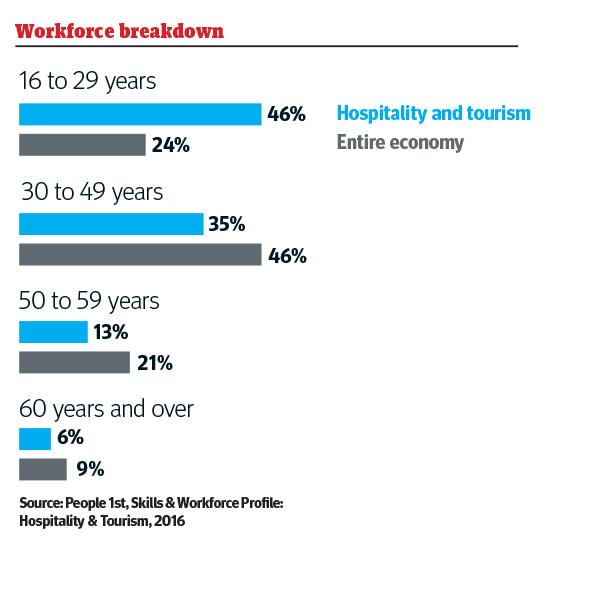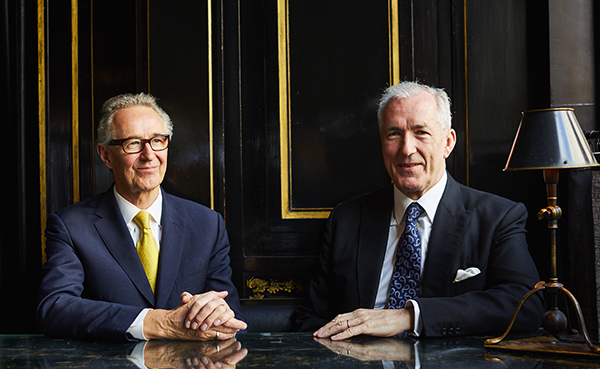Old dog, new tricks: why you should employ older workers
The latest article in our series on the staffing crisis in hospitality looks at how Britain's greying population could help to plug the widening personnel gap, while businesses and customers alike reap the benefits. Janie Manzoori-Stamford reports
"It's not that over-50s are better, but they're different," says Corbin & King co-owner Jeremy King. "There is the benefit of experience and wisdom to bring to bear, meeting the energy and innovation of younger workers."
The advantages of a diverse workforce that includes people of all ages is not lost on the veteran restaurateur, yet hospitality continues to be largely considered a young person's game. And with 81% of its UK workforce aged between 16 and 49, the numbers certainly reflect that perception, especially when compared to the 70% of workers in that age bracket for the UK economy as a whole.
The industry's perennial staffing problem has deepened since the June 2016 vote for Brexit. And with the UK's scheduled departure from the EU looming large, along with tighter controls on "low-skilled" migration that could exclude 90% of hospitality's EU workforce, it is fast heading for full-blown crisis mode.
Perhaps it's time to lay to rest the idea that people are over the hospitality hill when they hit 50, as older workers could play a vital role in satisfying the industry's staffing needs. According to a report by the Centre for Ageing Better that makes the "inter-generational case for supporting longer working lives", there are around one million unemployed people aged between 50 and 64 who have been pushed out of work involuntarily, which suggests a willingness to work given half a chance.
But there's a strong argument to say that this demographic of jobseekers can bring a lot more to the table than simply making up the numbers.
"Experience and an understanding of what needs to be done," says Tim Andrews, founder and managing director of Learn Train Recruit. "Young people don't have that yet, as most are still relatively new to the career or working their way up. Mature workers also tend to bring ‘stayability' within a job, as they don't look around for new opportunities at anything like the level that younger people do."
Amy Primrose, BaxterStorey's resourcing manager for the central region, agrees. "The skills they have learned over a 40-year-plus working life are often invaluable. They have experience in handling uncomfortable situations that someone fresh into the workplace may not," she says. "And it's this confidence in being able to share and educate others that makes them so desirable to a hospitality team."
see panel) â" have become mentors to their younger colleagues.
âDavid is known by his team as âdadâ because of his caring and approachable side. He is spoken of very highly by our catering teams and our customers alike,â she adds.
Indeed, customers are an important consideration when it comes to recruiting older workers. The UKâs ageing population is not only providing an often untapped recruitment pool, it is also creating a burgeoning pool of potential customers seeking a hospitality proposition to which they can relate.
People aged over 50 are forecast to increase eating out over the next three years, according to NPDâs The Future of Foodservice: Great Britain 2022 report, which determined that the UKâs foodservice industry must become more relevant to consumers in that age range in order to generate strong future growth.
So what can hospitality operators do to make themselves attractive to the older jobseeker who might be put off by the prospect of feeling out of their depth?
âEncourage them,â says hospitality consultant Simon Scarborough of Simon Scarborough Associates. âDevelop training programmes that concentrate on their skills to start with and boost their confidence. Then train other required skills, but tailor-make courses to ensure they bring the best out of this workforce without them feeling stupid.â
Benefits of an older workforce â¢Â Experienced and worldly-wise.
â¢Â Reliable.
â¢Â Confident in advising and supporting a younger workforce.
â¢Â Able to relate to an expanding pool of mature customers.
â¢Â Willingness to be flexible.
⢠Able to enrich the workforce with a different perspective.
Balance and perspective at Corbin & King
It introduced a recruitment strategy last year that sees Corbin & King actively encouraging older people to apply for positions within its eight-strong portfolio (soon to be nine, with the upcoming launch of Soutine in Londonâs St Johnâs Wood).
To be clear, the move is not designed to see older applicants selected in favour of their younger counterparts, not least because that violates current employment laws, but alongside them.
âWe consider it imperative to maintain and attract a diverse workforce in terms of age, gender and background as, by doing so, we not only enrich the experience of our employees, but also the service given to our customers, too,â says King.
The company uses a variety of channels to attract the more mature worker: some traditional, such as trade magazines and the national press, as well as websites aimed squarely at this demographic, such as employment sites Renegade Generation and Rest Less, which are built on the premise that being of a certain age does not automatically make a person ready to put out to pasture.
âI donât think thereâs anything an âover-50â couldnât do. I have had managers in their 20s in other organisations suggest that older people need special concessions through the likes of rotas. But itâs just not true until perhaps reaching 70-plus,â adds King.
âThe over-50s are important to everyone to bring balance and perspective, together with stability and knowledge. The country as a whole has 30% of its workforce over 50 years old â" with us it is more than 6% â" and thatâs better than most.â
Nigel Hart, private dining head waiter, the Delaunay (Corbin & King)
âOlder people in the field obviously have a hive of experience to pass on to guests and staff alike,â says Nigel Hart, private dining head waiter at Corbin & Kingâs the Delaunay, London. âWhen tricky situations crop up â" which they do â" one can use that experience, which has been gained over many years.â
Hart was 56 when he joined Corbin & King at the Delaunay in 2016, having previously worked with Chris Corbin and Jeremy King at the Ivy West Street. Between 1995 and 2014 he worked his way up to function head waiter, where he oversaw catering for 60-guest lunch and dinners, and canapé parties for up to 120.
âMy main role is to supervise and keep on top of the day-to-day running of our two private dining spaces at the Delaunay,â he explains. âBy overseeing these and effectively communicating with the kitchen and service teams, I make sure that excellent quality and superb service is always delivered, no matter what the event, be it business, leisure or a celebration.â
Michelle Chillingworth, general manager at the Delaunay, clearly values everything that Hart brings to the metaphorical â" and actual â" table.
âFirst and foremost, heâs great at his job â" the room wouldnât be the same without him,â she says. âOver the course of his career, Nigel has encountered every possible situation and, as a result, he knows how to read a room and he can handle everything that working in a busy restaurant can throw at him. Absolutely nothing phases him.â
BaxterStoreyâs David Gadsby is âanything but retiredâ
âMaybe the physical side could be a challenge, but Iâm a true believer that if youâve got any aches and pains, you come to work and you work them off,â he adds, demonstrating the kind of can-do attitude that the younger generations of workers are sometimes accused, rightly or wrongly, of lacking.
Directly prior to joining BaxterStorey, Gadsby worked as a host at the University of Nottingham, where for six years he welcomed guests. He has been a relief kitchen porter for the caterer for seven years and shows no sign of slowing down, enjoying the benefits that being in employment brings both to him and the business.
âI mostly come to work for the social side; it gets me up in the morning. I like getting out and it means Iâm not stuck in on my own all day,â he explains. âI most enjoy meeting the customers, having a chat and a joke with them. Theyâre great company.â
Gadbsyâs vim and vigour has certainly put him in the spotlight, both within the business and the hospitality industry at large. In 2018 he was awarded Kitchen Porter of the Year at the BaxterStorey Awards and placed second (alongside two other runners-up) in Winterhalterâs KP of the Year competition.
âWhoâd have thought it at 75?â asks Gadsby. His manager, for one. Hannah Garner describes Gadsby as a reliable, conscientious asset to the team who is âanything but retiredâ.
âDavid is very well respected, which promotes further respect among other members of the team. Customers love him â" his manner, his jokes, heâs really chatty,â she says. âWe are so lucky to have him on our team.â
So what is the secret to encouraging more David Gadsbys into the hospitality industry? âWe should promote flexible working,â says Garner. âZero-hours contracts receive a lot of negativity, but it works for David. He tells us when he wants a break or a couple of weeks off. Promote the flexibility, as thatâs a benefit.â
Beaverbrook invites a career change
âI wanted a change of daily life as Brexit had a negative effect on my business,â he says, commenting on the swerve in professional direction. âBeaverbrook was close to my home and it was intriguing.â
It may have been curiosity that took him into the hotel game but, according to Jake Greenall, Beaverbrook house manager, it is the experience and attitude that Wilkinson brings to the role that has really paid off.
âDuncan is incredibly personable and dedicated,â says Greenall. âHe brings experience of management, people skills and the outlook â" formed with time â" to look at the big picture.â
Today Wilkinson is a duty manager at the 29-bedroom hotel in Leatherhead, Surrey. His current role includes daily operations management, guest relations and assisting the front of house team â" responsibilities that all benefit from the reliability, patience, tolerance and humour that Wilkinson says he brings to the Beaverbrook table.
âItâs great fun to be a part of a team, lovely to interact with clients of all types and I love working in a beautiful environment surrounded by wonderful sights and varying daily challenges,â he adds.
From our sponsor
Across the UKâs hospitality sector, employers want staff members who are personable, composed and diligent. They often overlook a largely untapped talent pool: elderly people.
As the workforce gets older and state pension age is set to hit 66 by October 2020, employed elderly people will become more visible. Hospitality is often seen as a young personâs field, due to the stamina needed for various tasks and shifts starting and finishing at odd times.
However, with factors such as Brexit set to reduce the inflow of workers, the sector needs to be more creative. Employers could book shorter shifts and rotate elderly team members if they canât stand on their feet for long hours.
Work can be a good option to remain active and sociable; this enthusiasm could be a boon to customer service. The greater inclusion of elderly people would be a valuable gesture against ageism, demonstrating how people with decades of experience are more than capable in todayâs world of work.
The Caterer's staffing special
In light of the sectorâs well-publicised staffing woes, operators need to be thinking more outside the box than ever when it comes to recruitment. In this, the fourth in a series of features detailing how to engage previously under-utilised demographics, we investigate how businesses can tap into the talent pool of mature workers. Next week we will cover the recruitment of those with disabilities.
Get The Caterer every week on your smartphone, tablet, or even in good old-fashioned hard copy (or all three!).






















